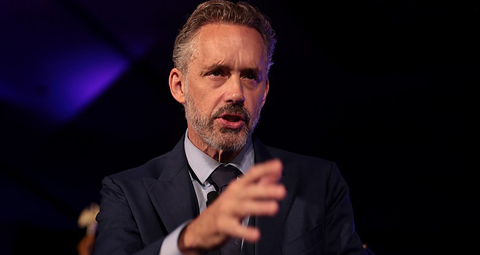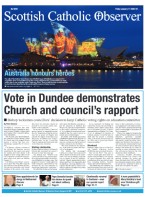January 4 | ![]() 0 COMMENTS
0 COMMENTS ![]() print
print

Peterson’s praise for Catholic morality
In the concluding part of the series, Richard Purden speaks to Jordan Peterson about Faith, Scottish Independence and the nature of evil.
IN 2018, Professor Jordan Peterson was cemented as a new kind spokesman for a disaffected generation around the globe, leaving many to consider his growing popularity as nothing short of a cultural phenomenon.
In the second part of this exclusive interview with the popular public intellectual and author, he describes the Catholic Church as the ‘lynchpin of Christianity.’
In his international bestseller 12 Rules For Life: An Antidote to Chaos, Dr Peterson considers the fashionable suggestion by various professionals that evil is an antiquated concept.
“I think you are vulnerable to what you deny,” he said. “If you familiarise yourself with 20th century history in particular and don’t walk away with a sense of evil then you just haven’t done the reading.
“It’s just one example, but the gates at Auschwitz that pronounced ‘work sets you free’—what is that? It’s a ‘joke,’ malevolence, and the denial of evil allows it to flourish.
“In the classic myths when the god Horus encounters his uncle Seth, the god of evil, it costs him the loss of an eye.
“It’s no wonder people don’t want to admit to [the existence of evil] because it permeates everything, the culture, the family and yourself, and to see that in those places is devastating.
“Often when naive people encounter someone truly malevolent it traumatises them so badly that they never recover, and even physiologically it causes damage; it’s no joke. It’s much easier to be casually forgiving and not take the problem with the degree of seriousness that it deserves.”
Scottish Independence
The professor doesn’t shy away from political subjects while in Edinburgh to deliver a talk. As a new debate around Scottish independence gathers momentum in the wake of further Brexit chaos, he shared his thoughts on the matter.
“I think coming from Canada we’ve wrestled with this for years,” he said.
“The way we solved it was to devolve a fair bit of power to the provinces and that actually seemed to work nicely.
“It’s a looser federation and I don’t think it’s done us any harm at all: it kept Canada within the fold.
“I think that if your country is already functioning in the top two or three per cent worldwide and by historical standards then you leave at your peril because the risks outweigh the benefits.”
He went on to add that the ‘UK has weathered a very large number of storms very successfully.’
“There are a million devils in the details,” he said. “You see that happening with Brexit which in a sense should be less difficult.
“You see the problems with that and the EU and UK have been integrated for a short time when you consider how long Scotland and the rest of the United Kingdom have been integrated.”
‘Lynchpin of Christianity’
When I suggest that many Catholics in Scotland are under pressure because of their views on a variety of issues, he said: “Maybe that’ll make you Catholics more serious again. The Catholic Church has been the lynchpin of Christianity for 2,000 years.
“I’m Protestant by descent but there is something to be said about an institution that has managed to maintain a structured and responsible moral view of the world for those many thousands of years.
“The Catholic stance on birth control: it’s not like Catholics don’t have a point—it is the case for example that the birth rate in western countries has plummeted below replacement.
“That is a fatal error culturally in a very short period of time so there is something to be said.
“It’s the same with the pro-life position. I think you can make a case about who has responsibility for what happens after pregnancy.
“I think in regard to marriage, it’s a truism that a stable and complex society is based on lasting marriage.
“It’s certainly the case that children do better with intact two-parent families—the research data on that is crystal clear. You need an institution that is standing for these things. More power to the Catholics.”
Dr Peterson’s beliefs
How does Dr Peterson describe his own personal belief? Part of what has given the author such an authoritative voice for many young readers is the Christian message at the heart of his writing and speaking.
“Whatever it is I believe is there all the time—it’s expressed as well I can in what I’ve written and said.
“I tell people I ‘act as if God exists.’ People are often not very happy with that because it often doesn’t fit in with the answer they wanted but it’s certainly the truth for me.
“I believe Christ’s statement that He is the truth and the life and that nobody came to the Father except through Him.
“The proper way to live, all things considered, is to love God with all your heart and your soul; that’s as good a way as expressing it as any other.”
Biblical parallels
Dr Peterson has a unique way of telling his readers and those attending his shows about a radical idea, that true happiness doesn’t lie in personal success or material, finite things, but that the key to existence is loving God despite many rival thoughts that work to separate the divine from the humanity.
Once again Dr Peterson references the Bible to illustrate his point.
“In the story of Cain and Abel, Cain hated and cursed existence,” he said.
“That’s the wrong way to live even though there are reasons you might feel compelled to do that.
“You have to open yourself up to the catastrophe of the world and work for its betterment and to do that most effectively you have to live in truth. I think those things are true. I suppose that is faith.
“It’s often easier in the short term not to say the things that you think are true because it might cause conflict or perhaps you can gain a short term advantage by saying something you believe not to be true.
“I’m terrified enough of the consequences of deceit so I try very hard not to say anything I don’t think is true. I also find it a great adventure.”










